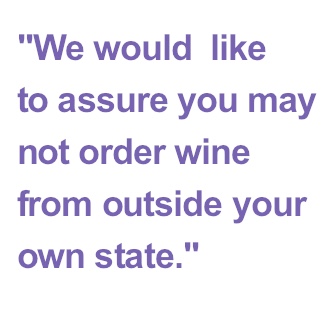Drizly: Working to Restrict Your Access to Wine
 In an interesting interview with Spirits Business published yesterday the CEO of Drizly—the delivery service for booze—predicted that online sales of alcohol could reach between $7-$15 billion over the next few years.
In an interesting interview with Spirits Business published yesterday the CEO of Drizly—the delivery service for booze—predicted that online sales of alcohol could reach between $7-$15 billion over the next few years.
Drizly CEO Nick Rellas heads a business that allows consumers to order alcohol from local your retail outlets, then delivers the stuff to your door.
What he did not say in the interview however is this: Mr. Rellas believes his customers ought to be banned from ordering and having delivered alcohol from beyond their local retailers. He opposes the right of his customers to purchase alcohol from outside their state and have it delivered.
Put another way, Mr. Rellas and his investors will work with legislators to assure that Drizly customers are only allowed to have alcohol shipped to them from retailers nearby who use Drizly.
Yes, it’s cynical. Yes, it’s anti-consumer. Yes, it’s anti-free trade. Yes, it’s anti-competition. Yes, it’s self-serving. And yes, it’s the same position of one of Drizly’s primary investors—The Wine & Spirit Wholesalers of America.
But let’s face it, Drizly’s model isn’t really online sales is it. Traditionally, the idea of online sales has been you go online, look for what you want at your favorite website without care for where it is located, you order, and you get your delivery.
Drizly’s form of “online sales” restricts its customers from sourcing what they want form a very restricted geographic location. Now, there’s nothing wrong with this. There certainly is a market for serving those who really need to have booze right this minutes and for some reason can’t leave their home to get it.
But let’s not confuse the service with some sort of innovative business model or technology. And let’s certainly not confuse it with giving consumers choice.
In the interview with Spirits Business, Rellas noted:
“As the world increasingly moves digital, people will continue to want to buy alcohol online just like they do everything else and as consumer demand increases, whoever can address and meet the needs of wants of consumers will win.”
Rellas is right. What’s interesting is that he wants Drizly to win by supporting government restrictions on who can serve those customers by limiting consumers choices through regulation.
Yes, it’s cynical. Yes, it’s anti-consumer. Yes, it’s anti-free trade. Yes, it’s anti-competition. Yes, it’s self-serving. And yes, it’s the same position of one of Drizly’s primary investors—The Wine & Spirit Wholesalers of America

Interesting. And totally makes sense. I never thought about it that way. Wish I had before I began advising a retail client on signing up with Drizly…